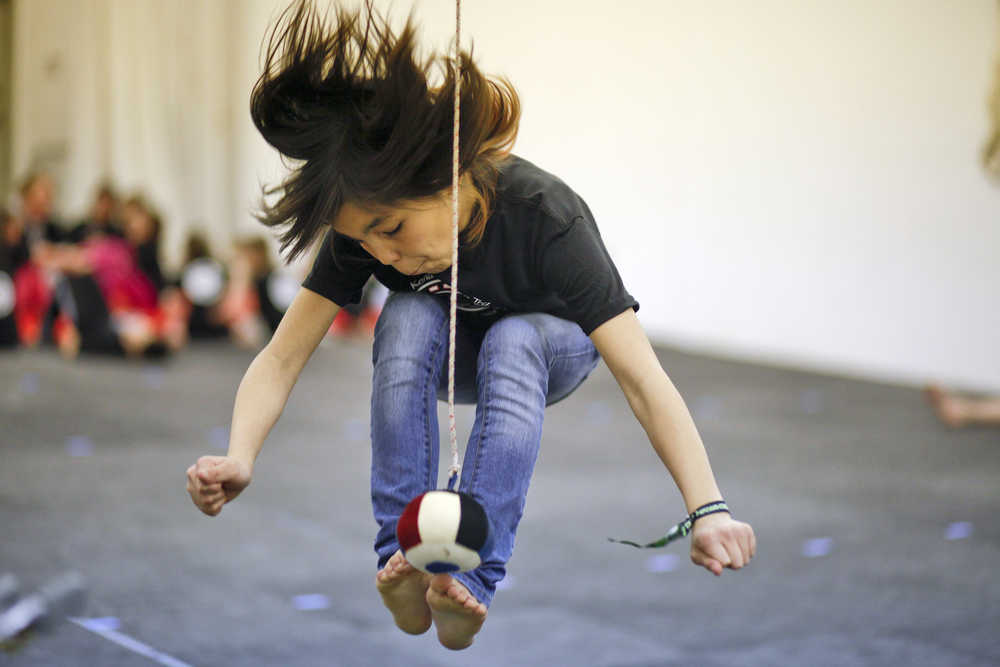Since October, the Kenai Peninsula’s Ggugguyni team has been gearing up for the Peninsula Winter Games and an annual showcase of talent, athleticism, culture and a unique form of sportsmanship at the regional Native Youth Olympics.
The team, now more than 40 students strong, will open the games on Friday, kicking off a weekend that also includes board games, kids activities and family fun that has been providing a break from the winter blues on the Central Peninsula since 1976.
The Native Youth Olympics, or NYO, have been paired with the games for four years, adding another activity to a weekend tailored for children.
NYO provides an indoor activity that isn’t subject to the weather, unlike some of the other events that have been canceled, or repurposed due to the year’s unseasonably warm temperatures.
“The biggest deal is the weather, of course, and without our ice carvings, that’s a huge fundraiser for the event that’s gone,” said Soldotna Chamber of Commerce event organizer Tami Murray.
When it became apparent that the ice wasn’t going to be available, organizers switched gears and are now offering a Friday evening adults-only monopoly tournament which, at $50 a ticket, should help offset some of the costs of the games, Murray said.
Other events have just been canceled.
“We’re probably not going to have any snowmachine rides or sled dog rides; maybe not even kicksled rides,” Murray said. “A lot of the outdoor activities are going to be kind of replaced with the indoor ones.”
Jumpin’ Junction will have two large bouncehouses and the National Guard is bringing a climbing wall. Both will be at the Soldotna Sports Complex, 538 Arena Ave. off Kalifornsky Beach Road, on Saturday.
For a different kind of entertainment, one that could be interactive for school-aged kids, NYO offers a glimpse into Alaska Native culture and insight into a different kind of competition.
While events like the one-legged high kick and the seal hop require an astonishing amount of athleticism, others like the Indian stick pull require a level of craftiness that doesn’t necessarily require competitors to be in top physical form.
Organizers leave five open spots in each game for kids in the crowd who want to participate.
During the games, the competitors will often push themselves to compete and then immediately began cheering for the other competitors.
“They’re competing against themselves, trying to better themselves,” said Kenaitze Indian Tribe Yaghanen Youth Center programs director Michael Bernard.
As Bernard spoke about the games during a recent practice, his older students spent most of their time helping the younger kids with technique.
The Indian stick pull drew a long line of hopeful competitors near the end of the practice. It requires two people to grasp a greased stick and try to yank it out of each other’s hands.
Kya Ahlers, 13, said the trick to the pull was to push first.
“The stick is supposed to be a fish,” she said. “The other person is like the fish and they’re wiggling it and so you grab onto and pull it so the fish doesn’t get out of your hands. I push forward first and get the extra part (of the stick) and then I pull.”
Ahlers got a taste of competing against herself as she worked on her one-foot high kick, a task that requires jumping off the ground with both feet, kicking one foot high and touching a beanbag suspended off of the floor, then landing on the foot that kicked the bag.
While Ahlers psyched herself up for her 66-inch jump, Bernard walked behind her and quickly raised the bag.
Ahlers took a deep breath, leapt off the floor and landed off-balance and without touching the bag the first three times she tried.
“Come on, you can do this,” Bernard said.
Ahlers looked at the bag one more time, took a deep breath, jumped and barely grazed the bag with the tips of her toes before landing in a perfect crouch.
She nodded as Bernard told her to get a nearby measuring stick, but her serious expression gave away to a wide smile when she saw the height of the bag.
“70-inches?” she said. “I did not know that I could kick that high. That was awesome. This is my favorite event.”
Bernard said support from visiting teams, parents and the community was a large part of encouraging the kids to better themselves.
“The idea is that bettering yourself would better your community — so competing against yourself and making yourself better makes your team better,” he said.
Reach Rashah McChesney at rashah.mcchesney@peninsulaclarion.com.

